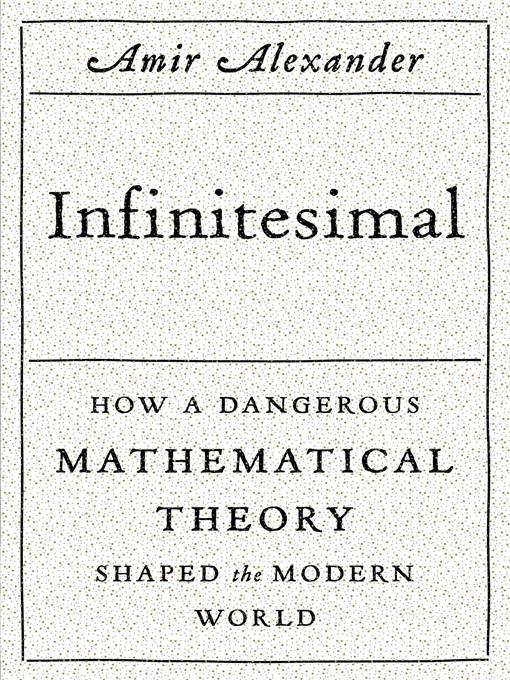
Infinitesimal--How a Dangerous Mathematical Theory Shaped the Modern World
کتاب های مرتبط
- اطلاعات
- نقد و بررسی
- دیدگاه کاربران
نقد و بررسی

January 27, 2014
UCLA historian and mathematician Alexander (Geometrical Landscapes) gives readers insight into a real-world Da Vinci Code–like intrigue with this look at the history of a simple, yet pivotal, mathematical concept. According to classic geometry, a line is made of a string of points, or “indivisibles,” which cannot be broken down into anything smaller. But if that’s so, how many indivisibles are in a line, and how big are they? And what happens when you divide the line into smaller segments? It seemed that indivisibles weren’t really indivisible at all, a “deeply troubling” idea to the medieval Church and its adherents, who demanded a rigidly unchanging cosmos with no surprises. Churchmen and respected thinkers like Descartes railed against infinitesimals, while Galileo, Newton, and others insisted the concept defined the real world. The argument became an intellectual and philosophical battleground, in a Church already threatened by doctrinal schisms and social upheaval. Focusing on the Jesuits, beginning with the German Jesuit mathematician Christopher Clavius, Alexander explores this war of ideas in the context of a world seething with political and social unrest. This in-depth history offers a unique view into the mathematical idea that became the foundation of our open, modern world. Agent: the Garamond Agency.

Starred review from March 1, 2014
In the mid-17th century, debate raged over a mathematical concept of the infinitely small--and nothing less than modernity as we know it was at stake. At its core, the public argument over the infinitesimal--the idea that a line is composed of an endless number of immeasurably small component parts--is rooted in the ideological scope of post-Reformation Europe. The church, struggling to maintain autonomy over an increasingly disparate populace, fought to bar the infinitesimal from mathematical doctrine due to its implication that nature itself is not orderly, logical and completely subject to deductive reasoning. At the same time, leading intellectuals like Thomas Hobbes and John Wallis insisted that embracing the idea of the infinite in mathematics would open up a remarkable new opportunity to experimentally explore the world around us. Alexander (History/UCLA; Duel at Dawn: Heroes, Martyrs, and the Rise of Modern Mathematics, 2010, etc.) tells this story of intellectual strife with the high drama and thrilling tension it deserves, weaving a history of mathematics through the social and religious upheavals that marked much of the era. For the people of Europe, more than just academic success was on the line: The struggle for civil liberties and rebellion against the rigid doctrines of the establishment were entrenched in the conceptual war over the infinitesimal. The fact that progressive mathematics prevailed was unquestionably momentous, as the addition of the concept of the infinitesimal eventually led to calculus, physics and many of the technological advances that are the bedrock of modern science and society. The author navigates even the most abstract mathematical concepts as deftly as he does the layered social history, and the result is a book about math that is actually fun to read. A fast-paced history of the singular idea that shaped a multitude of modern achievements.
COPYRIGHT(2014) Kirkus Reviews, ALL RIGHTS RESERVED.

Starred review from March 15, 2014
Convinced that it opened the Royal Road through the mathematical thicket, seventeenth-century mathematician Evangelista Torricelli trumpeted the method of indivisibles. Yet in recounting how that method originated, provoked vigorous resistance, and finally prevailed, Alexander tells a story with implications far beyond mathematics. Premised on the definition of a line as a composite of countless infinitesimally small elements, the method of indivisibles opened the door to calculus. But it also subverted Aristotelian philosophical principles, so alarming defenders of the status quo. Alexander compellingly chronicles the clashes as Galileo squares off with Pope Urban VIII in Italy, and royalist Thomas Hobbes crosses swords with puritan John Wallis in England. Beyond what it teaches about mathematics, the intellectual combat illuminates the tempestuous birth of modernity. Alexander credits the champions of indivisibles with helping to usher in an era of progressive tolerance and democracy, and he indicts their foes as hidebound authoritarians. But as readers explore the personalities and life trajectories of the combatants, they will recognize complexities that do not fit into Alexander's overall script: Bonaventura Cavalieri (one of the discoverers of indivisibles) was a cautious monk, while Ren'Descartes (the father of modern philosophy) rejected the new mathematics. A bracing reminder of the human drama behind mathematical formulas.(Reprinted with permission of Booklist, copyright 2014, American Library Association.)

























دیدگاه کاربران